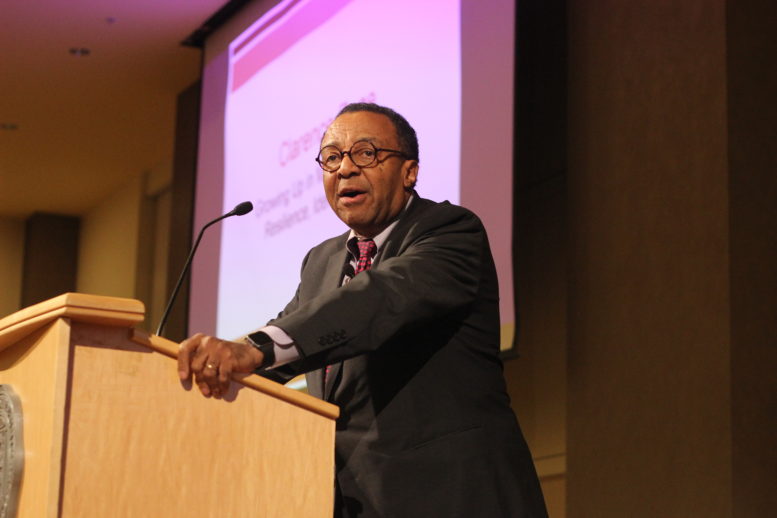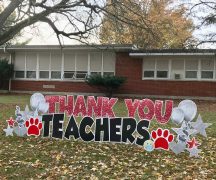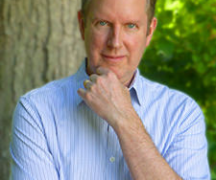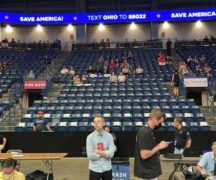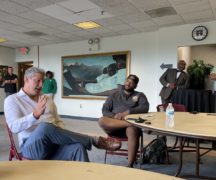By DAVID DUPONT
BG Independent News
Clarence Page is a story teller. That’s what all good journalists are, the two-time Pulitzer Prize winner said.
On Thursday at Bowling Green State University, though, he reflected on someone else’s story, J.D. Vance’s “Hillbilly Elegy: A Memoir of a Family and Culture in Crisis.” Vance’s book has been selected as the university’s Common Read. Page was invited to BGSU to discuss Vance’s book.
Meant to bring everyone together to read the same book and spark discussion, this year’s selection has done the trick. Social media is full of commentary on the book, and even its appropriateness as the Common Read.
“Hillbilly Elegy” arrived at the same time as Donald Trump was elected to office, and many reviewers touted it as the book to read if you wanted to understand Trump voters.
Vance takes a hard look at his people, who feel displaced in America and are plagued by dysfunctional families and unemployment. This demographic is the most pessimistic of any in the country. Poor whites are more pessimistic than poor Blacks. Page said: “Maybe because we’re used to it.”
Page, who like Vance comes from Middletown, Ohio, said the book gave him a look at what was happening on the white side of town. Page noted he started out as “colored,” and has been a Negro, Black, African-American, before now being a person of color. His family, he said, was “po’” because, according to his father, they were too poor to afford the “or.”
But, he added, “ we were rich in spirit.”
Page, 70, said he’s told Vance that save for the difference in age and race, it could be his story. But there were differences. Unlike Vance who chronicles a difficult family life, Page said his family was boring, a quality he’s come to appreciate as he’s gotten older.
Like Vance’s grandfather, Page’s family moved north from the south to work in northern industry. Page’s people were part of the Great Migration that brought Blacks north by rail seeking an escape from the segregated south and seeking greater opportunities.
And Page remembers the lure of the railroad, looking down the tracks imagining an escape from Middletown.
He succeeded in large part because of what he learned there. He wanted to be an astronaut but his vision, “being four-eyed” ended that dream. But he was also captivated by seeing the reporters during a whistle stop in the 1960 campaign by then presidential candidate Richard Nixon. Others watched the vice president; Page had his eyes on the press.
The high school newspaper advisor Mary Kindell recruited him for her staff. “Bless her heart, she saw some talent in me.” He did it to meet girls, but he found “I was pretty good at it. I enjoyed it.” He liked meeting people. He liked telling stories. “What was important was somebody had faith in me.”
When he won his first Pulitzer Prize in 1989, a former classmate called him to write a profile, and that sent Page back to the yearbook where he discovered Mrs. Kindell had written: “Remember me when you win your first Pulitzer. Don’t forget.” He looked up her number and called to remind her. She said he always had faith in him.
He went on to Ohio University where, as he told a student, he learned that the most important part of being a reporter – “we weren’t journalists back then we were reporters” – was to spell the names right, especially in an obituary. He didn’t necessarily like writing obituaries but still there were stories there. That was the second most important thing he learned during his apprenticeship: “We’re all storytellers.”
The story “Hillbilly Elegy” offers is “a picture of an odyssey from poverty and family dysfunction to success and family appreciation in the person of J.D. Vance,” he said.
That story “gave me insight into my own life and background. … I felt I was learning what family life was like on the white side of town and that life was surprisingly similar to my own.”
Vance is a moderate conservative, Page said, a “Middletown conservative.”
Even Page, now a well-known liberal, said as a high school student his “pet peeves” were “Communists and Democrats.”
“That was Middletown. That was the politics. That was the sociology,” he said.
The economy was centered on Armco Steel. That’s where Page worked summers to pay the $700 tuition, $1,200 with room and board, at Ohio University.
The company was a paternalistic presence in town. Workers got health insurance and pensions. If they needed help, they turned to civic organizations and churches, not the government.
So Page wasn’t surprised his hometown would vote for Trump, but he was surprised Ohio, after voting for Barack Obama twice, would go for the Republican maverick.
Page feels Vance underestimates the role racism played in the Trump victory. In Vance’s view, those voters were alienated by Obama who attended Ivy League schools and spoke like a constitutional law expert. But, Page said, the same could be said of Donald Trump, except Trump “speaks like someone still trying to learn English as a second language.”
Page noted the large number of Republicans who doubted Obama was an American citizen.
Still the journalist understands Trump’s basic appeal. “Voters had the sense that this guy was one their side.”
As BGSU political scientist Melissa Miller pointed out at a panel discussion earlier in the day, Page said, Trump had support from a broad swath of white voters, not just low-income ones.
Vance, Page said, is “obviously conflicted over how much of our success failure in life is circumstance and how much is our responsibility. He reminds us in the Middletown fashion that we all have some agency, have choices and the choices we make can determine the direction we take.”
Page said that “some of us have more direction in making those choices.” He was fortunate, he said, to have “boring parents” who guided him on the right path. But economic stress puts additional pressures on those families.
Page said the while Vance paints a vivid picture of the problems of his lower income white subjects, he hedges when it comes to prescribing any solution. “He’s still trying to find the answers.”
Vance will get a chance to tell his own story when he comes to speak at BGSU Nov. 29, and Page urged his audience to press him about what his solutions would be.

